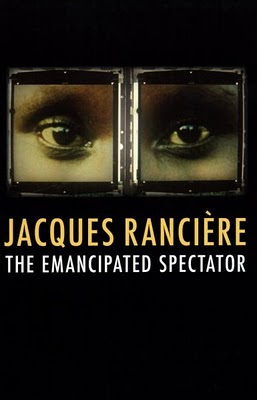The Emancipated Spectator

Ranciere, Jacques. The Emancipated Spectator. Trans. by Gregory Elliot. London: Verso, 2009.
I cannot thank Dr. Mary Bryson enough for pointing this book at me.
Here, Jacques Ranciere engages on debates about how to understand spectatorship and spectacles. His main point being that there is no such thing as a passive spectator who is a blank receptacle of the flood of images and susceptible to ideological manipulation. Being a spectator is then not something negative on itself, as meaning is produced in an indeterminate way and thus cannot be calculated in advance. In this way, he counters Debord formula that the more a subjects contemplates (his/her own disposession), the less he/she lives. Ranciere proposes to understand viewing as an action in which spectators are also "active interpreters of the spectacle offered to them" (13), "who develop their own translation in order to appropriate the 'story' and make it their own story" (22).
Ranciere also takes issue with the left-wing irony or melancholy that anticipates any kind of social critique is already absorbed by the logics of capitalism and free market, as even acts of protests are already framed as ("youth radicalism") fashion, commodities, and spectacle. Instead, he poses an approach based on a different set of assumptions: "that the incapable are capable; that there is no hidden secret of the machine that keeps them trapped in their place...there is no fatal mechanism transforming reality into image; no monstruous beast absorbing all desires and energies into its belly; no lost community to be restored. What there is are simply scenes of dissensus, capable of surfacing at any place and at any time.(...) It means that every situation can be cracked open from the inside, reconfigured in a different regime of perception and signification." (48-49)
In this way, aesthetic experience is politically effective not so much in terms of offering a convincing rhetoric of what should be done as an agenda for emancipation, but as far as it can "change the cartography of the perceptible, the thinkable and the feasible" (72). Since there is not direct and/or transparent relation between the artist's intentions and the effects on the audiences, this poses a challenge for "political art" that seeks to have an emancipatory effect. This fundamental indetermination is useful to think of art as a way to open up new forms of political subjectivation through the multiplication of connections and disconnections between signifiers.


Comments
Post a Comment